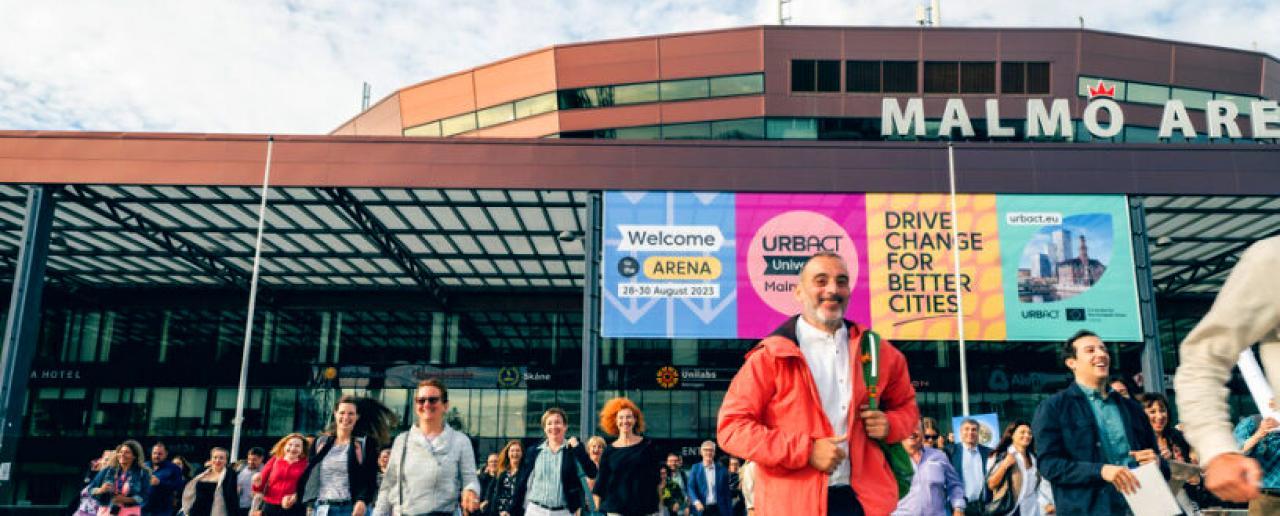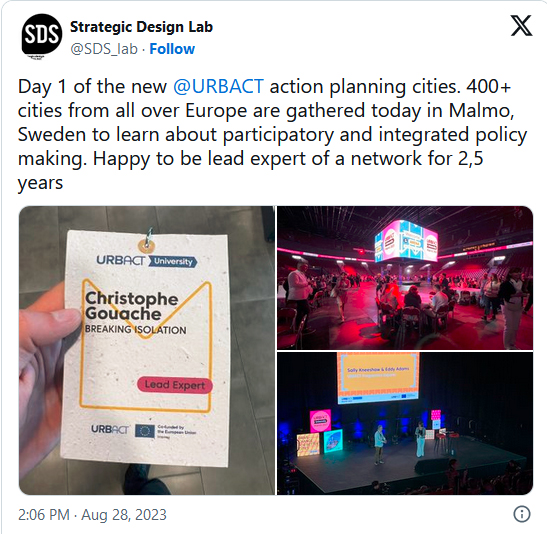The URBACT University made its big return in Malmö, from 28 to 30 August 2023 for more than 400 city representatives involved in the 30 recently approved Action Planning Networks. Since its first edition in 2011, the event was established as a programme capacity-building milestone.
Designed for local stakeholders from URBACT beneficiary cities, the event aims to provide concrete examples and insights as to how the URBACT Method can be put into practice, so participants can go back home ready to set up their URBACT Local Groups and experiment solutions to co-develop their own local Integrated Action Plans.
Find out what was in stock for the participants during these three special days!
1. Trying out the URBACT Method and tools
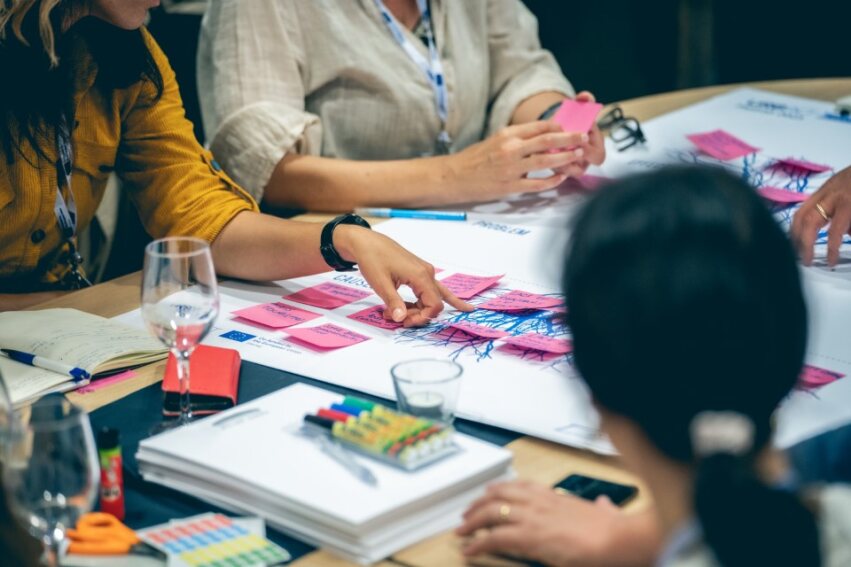
Once a day, for more than one hour, participants were introduced to techniques and tools that would not only help them create and maintain their URBACT Local Groups, but also to truly understand their local challenges, develop collective visions and plan actions to achieve their objectives. Split in hubs with different networks, discussions were then held in an enabling and safe space for exchange. Participants then moved to the Network@Work sessions, where within smaller groups, they did practical exercises and put into practice the lessons learnt on analysing problems and envisioning scenarios, getting all stakeholders on board and, finally, planning integrated actions.
All the materials that were used are available in the URBACT Toolbox and they will definitely come at hand during the action-planning journey. As one participant, Øystein Leonardsen from the City of Copenhagen (DK) said, "the more tools you have in your own toolbox, the better equipped you are to face different challenges". After all, if you only have a hammer at hand, all the problems you will encounter will be handled in the same way, regardless of any complexity or specific cause. "With a hammer, all you can do is to hit nails on the head".
2. Meeting with peers from all over Europe
For many of the people who are involved with the newly approved round of Action Planning Networks, the URBACT University was the first time ever they could meet with all their project partners. Besides many coffee breaks and opportunities to chat, participants had the unique chance to be closer to their networks, notably during the Network@Work sessions. As Clémentine Gravier, Head of Unit - Networks and Capacity-Building at the URBACT Secretariat, said "after two editions of the URBACT e-Universities online, one in 2020 and another one in 2022, it was nice to finally be able to organise this in-person capacity-building event. The truth is nothing can beat real-life exchanges and learning from each other over three days".
3. Experiencing a low carbon event
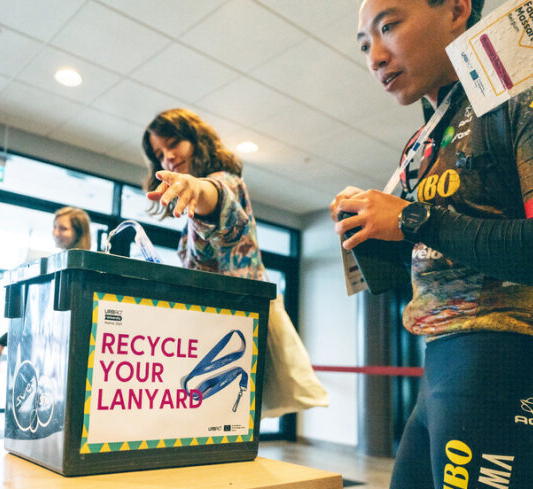
It is no news that URBACT has a taste for low carbon events, this year’s University was no exception. With an entirely plant-based menu, measures were taken to prevent food waste. As some might have noticed, leftovers were safely re-used in different meals. Also, by supporting and campaigning for soft means of transportation, the programme has effectively encouraged participants to step out of their comfort zone. One participant partially biked from Rotterdam (NL) to Malmö (SE), while many others traveled by train, including a participant from Liège (BE).
Other than all the nice memories, new knowledge and the beautiful badges made of recycled paper full of wildflower seeds ready to plant, participants did not take anything else back home. Even the lanyards of the badges were left behind to be re-used for future URBACT events. Unlike previous URBACT Universities, no goodies or merchandises were offered. All the carbon footprint of the URBACT University will be measured and will be offset with financial compensations to afforestation projects and other green local initiatives.
4. Discovering Malmö's corners
On the very first plenary of the event, participants were warmly welcomed by Sofia Héden, Deputy Mayor for Environment and Internal services at the Malmö Municipality. During this session they also learnt that the main venue of the URBACT University, the Malmö Arena, will host next year’s edition of the Eurovision competition. This is just one among many interesting things that the city has lined up.
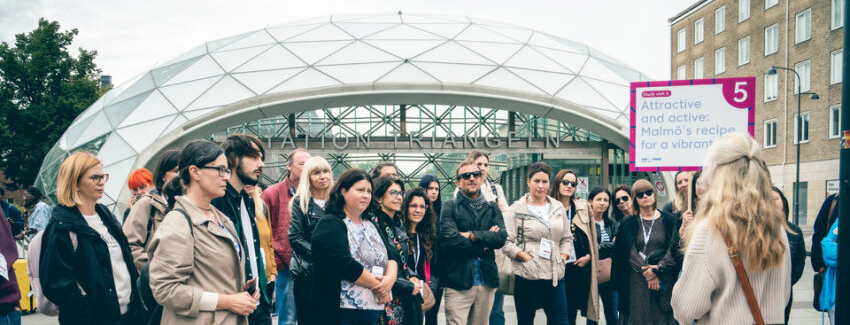
Participants at the train station ready for the "Attractive and active: Malmö's recipe for a vibrant city" site visit.
As in any URBACT University, the hosting city is a feature of the event itself. The programme takes great pride in showcasing local initiatives, existing projects and future plans. Malmö, in particular, has long been an URBACT beneficiary. The city was involved with the RESILIENT EUROPE (2015 – 2018) and the LET’S GO CIRCULAR (2023 – 2026) Action Planning Networks, both very environmental-led networks.
During the afternoon of the second day, participants had a glimpse of some of the cities’ hidden gems. Unsurprisingly, among the 12 site visits people could choose from, the majority focused on circular economy. But a few exceptions included the urban regeneration of the old and new parts of the harbour; gender equality and placemaking; and entrepreneurship and migrants’ integration.
5. Having plenty of surprises
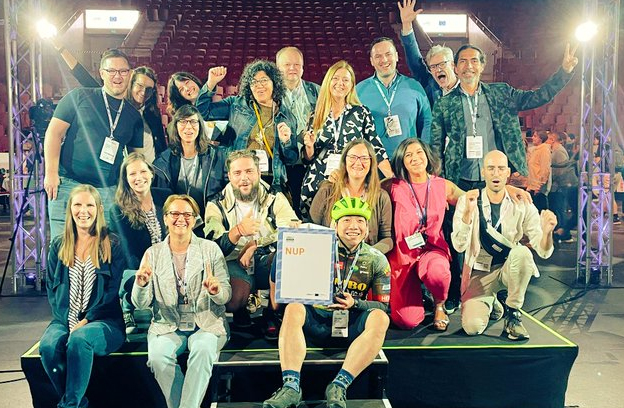
As Eddy Adams, URBACT Methods and Tools’ Expert, mentioned during the event, his favourite part of Universities is the element of surprise. From Action Planning Networks taking over the stage to strike poses and taking pictures, to unexpected settings behind the curtains, the URBACT University in Malmö was not short on surprises. Even some of the National URBACT Points had a special part to play. Disguised as mayors coming from different EU countries, they visited participants’ sessions and invited them to consider the crosscutting themes of green, digital and gender to their reflections.
The event even counted with a rooftop unexpected dance class, something that alongside the new connections that were created, and the knowledge and skills that were acquired, will not be forgotten any time soon.
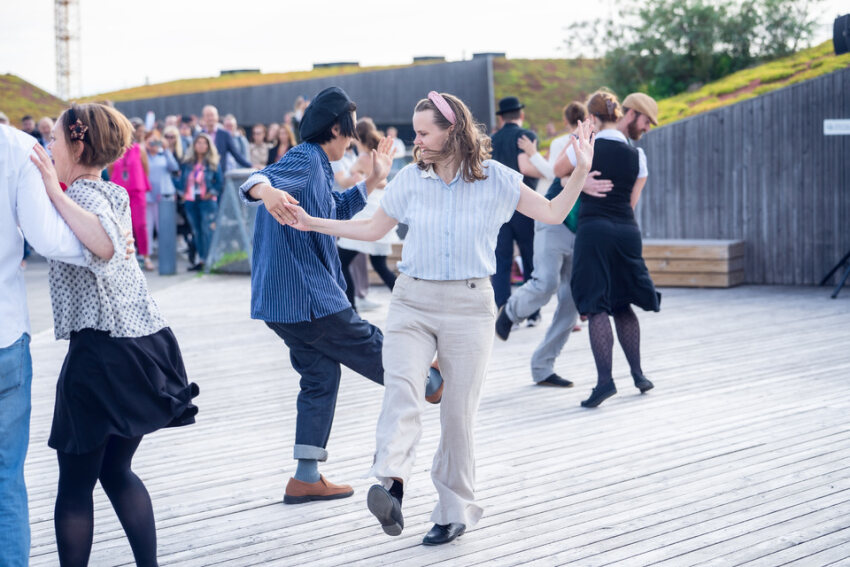
Swing dance class on the rooftop on the last day of the URBACT University.

